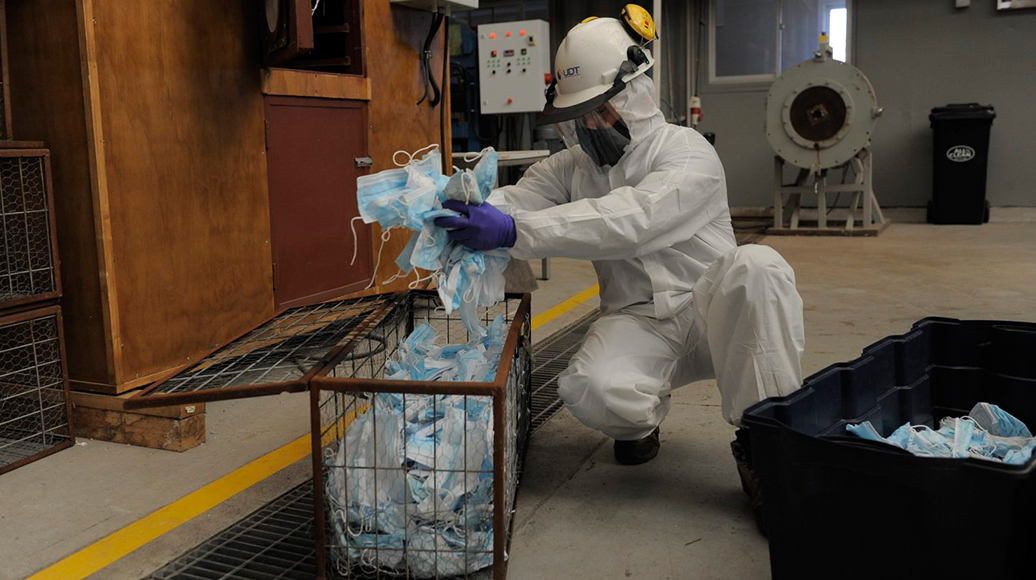Thanks to a partnership between the public, private and academic worlds, it has been possible to valorize “covid waste”, preventing thousands of these protective elements from contaminating beaches, rivers or parks.
Coasters, flowerpots and pencil holders developed from recycled plastic masks is the result of a promising circular economy project that linked the Ministries of Environment and Science, the University of Concepción and the Industrial Fishing of the Biobío Region.
The idea arose at the beginning of the pandemic to give a sustainable use to the more than 20,000 surgical masks used every week in the Biobío fishing plants. These elements of personal protection are essential to prevent contagion, but represent a severe environmental risk. They are made of tiny polypropylene fibers, a material that practically does not degrade, contaminates different ecosystems and harms birdlife.
The Minister of the Environment, Carolina Schmidt, said that “given the prolonged nature of the pandemic, this pilot project, developed by the Fishing Industry Association in conjunction with the UDT of the Universidad de Concepción, is an excellent initiative that we support and that will help us to combat ‘covid garbage’, made up of plastic masks or gloves that often end up contaminating our beaches, rivers, parks or streets”.
Macarena Cepeda, president of the Fishing Industry Association (ASIPES) advanced a second stage. “The sea is our source of raw material supply and we quickly noticed that the masks were becoming a new threat to the sea. We joined this project, recycling those used in some plants in Talcahuano and Coronel”.
He added that “our dream is that this project will grow and be replicated by other industries throughout Chile. We are proud of the work developed here in the region and that our sector is leading in the recycling of this waste. We are working on a second stage that will add more plants, which will increase the volume recovered and will give continuity thanks to the commitment of the companies and workers”.
At each plant there are separate containers for collecting the masks, which are removed monthly and undergo a rigorous sanitization process.
Projection and diversification
The initiative was born in the Regional Government’s Social Roundtable, in which the Fishing Industry Association, ASIPES, participates, and was promoted by the Seremis of Science and Environment. The Technological Development Unit (UDT) of the Universidad de Concepción is in charge of its execution.
As the pandemic progressed, its relevance increased and from July to December 2020 more than 145 kilos of three-fold and N95 type masks were collected, which after a mechanical process were converted into coasters.
The executive director of the Technological Development Unit (UDT) of the Universidad de Concepción, Álex Berg, highlighted the link with one of the most relevant productive sectors of the region, which allowed amplifying the effect of the innovations developed in the center. “Together with the Fishing Industry Association, we developed a solution that is not only at a conceptual or laboratory level, but we were able to scale it up to a pilot level and generate commercially valuable products from this waste,” he said.
Meanwhile, the Minister of Science, Andrés Couve, highlighted the collaborative effort to provide a solution to a problem generated by the Coronavirus. “This union of the academic sector with Asipes allows us to think of a future of recycling these masks to be able to give a second life to the materials that have already given us protection during this pandemic,” he said.
The good results of the pilot allowed us to expand it and formalize a waste recovery service. Thus, since January to date, 345 kilos have been collected and work is underway to generate other products. The four initial plants – owned by Landes, Blumar, PacificBlu and Camanchaca – were joined by three other units operated by Blumar, Orizon and Camanchaca.
Pesca Industrial prioritized this initiative and, as of this year, the participating companies will assume the costs of treatment in order to give continuity to the project and contribute to controlling the environmental impact of these personal protective equipment.
In the medium term, the initiative aspires to achieve a circularity model that allows obtaining plastic products that can be used in everyday objects or utensils, such as corporate gifts or artifacts present in their sales rooms or casinos.
Source: Ministry of the Environment

